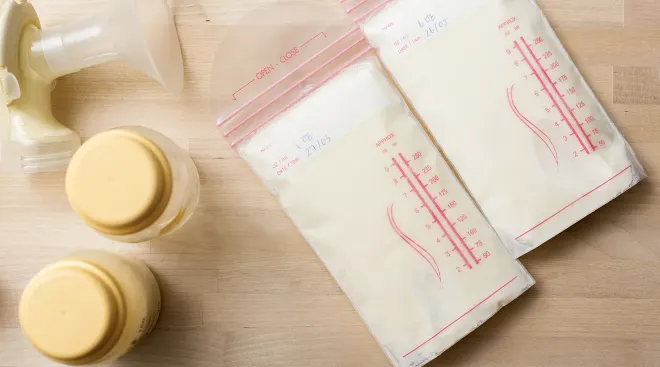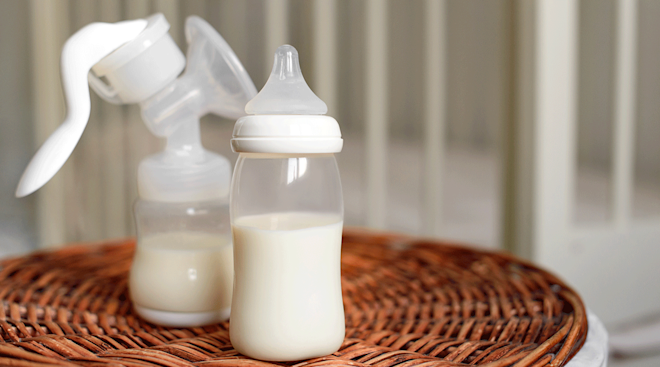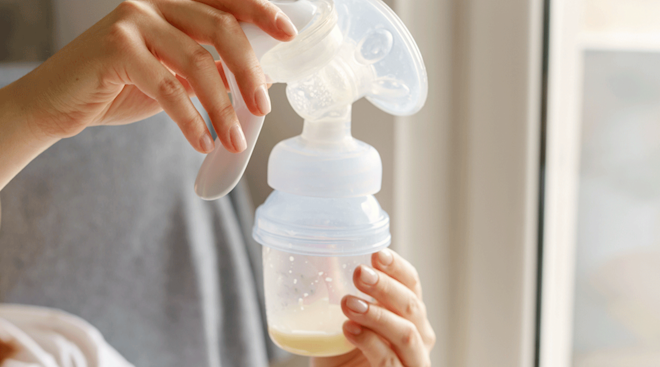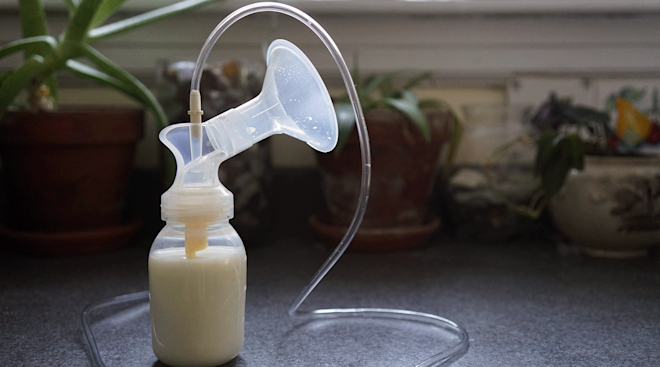Combo Feeding Baby: How to Supplement With Formula
There are a few reasons you might be exploring supplementing breast milk with formula, which is also called combo feeding baby. You might be struggling to keep up your breast milk supply. You could be seeking some flexibility. Or, you might just be curious about how combination feeding works if you’re thinking about weaning off breastfeeding in the near future.
Below, we narrow in on how to combo feed by supplementing with formula.
Breast milk is great, but it’s not the only option. If you’re thinking about supplementing with formula and embracing a combo-feeding strategy, know that this can be a great happy medium. Combo feeding baby is generally considered very safe, but it’s worth a conversation with your pediatrician.
There are a few reasons moms may consider supplementing with formula.
- Baby’s not getting enough breast milk. This can be because of difficulty with latching or transferring milk from the breast, or sometimes you’re not producing enough milk to support baby’s growth, says Jenelle Ferry, MD, board-certified neonatologist and director of feeding, nutrition and infant development at Pediatrix Medical Group in Sunrise, Florida.
- Baby was born preterm. Preterm babies (born at less than 37 weeks) will likely need some form of additional formula supplementation or fortification of mom’s milk to provide nutrients to support development, says Ferry. “For premature infants, when they’re still very small at hospital discharge, this may mean a fortifier designed specifically to be added to breast milk, or when a bit larger, it may mean a premature infant formula that’s either given in addition to Mom’s milk or sometimes added in its powder form to mom’s milk.”
- Baby has a metabolic condition or other medical problem. “Certain malabsorption disorders or mild kidney disease might require different kinds of specialty formula supplementation (different than standard term baby formulas); infants with hemodynamically significant congenital heart disease may need extra calories to grow and therefore require supplementation with calorically-dense formulas,” says Ferry. “This is often achieved by supplementing some feedings with more concentrated formula while still providing other feeds of breast milk.”
- Mom is sick or on certain medications. You might need to temporarily stop breastfeeding if you have certain infections, taking specific prescription medications or if you have an active herpes lesion on the breast.
- Mom needs more flexibility. Maybe you aren’t interested in exclusively breastfeeding, or you’ll be away from baby and don’t want to pump throughout the day. Similarly, if you need to return to work, a combination-feeding schedule can be a great option. It’s also fine if you just need a break now and again.
Combo feeding can be especially beneficial in a situation where either baby needs more calories or Mom’s body isn’t quite able to keep up with the volume that her baby may need, Ferry says.
In these cases, providing some supplementation can ensure baby continues to grow and develop, while also getting the unique benefits that only breast milk and breastfeeding can provide. “Babies get benefits from breast milk even when it can’t be their sole source of nutrition,” says Ferry.
Additional benefits include getting more help with feeding baby and knowing there’s formula available if you don’t have breast milk stored up in bottles.
It might also bring you peace of mind to know there are options you’ll always have on hand for feeding baby if you don’t feel comfortable breastfeeding in public and didn’t pack bottles. As a mom of two who was home with both babies by myself much of the day and on the go, I liked that I could pack a bottle with powdered formula and a bottle of water and didn’t have to worry about finding a place to breastfeed with an active toddler or concern myself with how many hours my bottled breast milk was sitting out if we were away from a fridge.
In any case, it can be huge relief to know you and your breasts aren’t solely responsible for feeding your little one. And this can be a major boon to your mental-health.
There’s a possibility baby might experience digestive issues once you introduce formula. Formula is derived from non-human milk (most often cow’s milk) and therefore has different bioactive components. “Babies will likely digest breast milk and formula differently, and formula often can change stooling patterns—usually babies [poop] less often on formula,” says Ferry.
There are also fewer bioactive components in formula that are beneficial for gut health, and it lacks factors in human milk that may be important for intestinal growth and digestion, adds Ferry. “Many formula companies have started to add things like probiotics (good, healthy bacteria), prebiotics (food for good bacteria that also stimulates intestinal growth) and DHA (one of many essential fatty acids important for growth and brain development),” she says. “These additions are still less than what’s available in breast milk, and in smaller quantities. The probiotics and prebiotics in breast milk support a more diverse, and what seems to be a healthier, gut microbiome than formula.”
Breast milk also contains growth factors, inflammatory mediators and a whole lot more that stimulate intestinal growth and motility, says Ferry. “Babies can get these benefits of combo feeding by ensuring that breast milk can still be provided.”
Additionally, supplementing with formula might affect your milk supply. If we think of human milk production as a kind of “supply and demand” situation, if an infant is getting a formula bottle, Mom’s body has no idea and doesn’t get that stimulation, says Ferry. Pumping can be particularly helpful to keep the demand going.
Donna Kimick, IBCLC, RLC, founder of Lake Shore Lactation in Long Island, New York, recommends pumping after a feeding or on the other breast if baby typically nurses on one side. This will help keep up your supply and ensure you have breast milk stocked up.
There’s no right or wrong time to introduce formula and begin combo feeding. You do what works best for your situation. That said, you might want to wait a few weeks after birth to ensure your milk supply is sufficient, says Ferry.
How you supplement with formula is up to you. You can choose to breastfeed during the night and combo-feed using formula during the day—or give a few ounces of breast milk and then finish with formula. You might also decide that formula during the day while you’re away from home or on the go makes your life easier. Do whatever is best for your family.
Have patience with the process and know that the first formula you choose might not be the best one for baby. “You might want to give them a quarter of an ounce after you’re done breastfeeding….just to see how the baby acts,” suggests Kimick.
“Some people will just give half breast milk and half formula in a feeding, others will give a whole feeding of milk, and then the next feeding you might want to give formula,” she adds.
Can you mix breast milk and formula in the same bottle?
It’s best to keep breast milk and formula in separate bottles, says Ferry. The main reason is to ensure baby gets all of the breast milk first. For example, “if a bottle is mixed and baby doesn’t drink all of the milk that was prepared, they’re missing out on both breast milk and formula,” she says. “On the other hand, if baby takes a bottle of breast milk first, then whatever isn’t finished is formula.” Also, the two have different “shelf lives.” If baby doesn’t finish a bottle of formula, you have to dump the rest out. If they don’t finish the breast milk, you can still use it again later. (Also, never use breast milk instead of water when mixing a formula bottle.)
Frequently Asked Questions
If you're breastfeeding, when's a good time to introduce a bottle?
“In general it’s a good idea to wait until breastfeeding is well-established before introducing bottles,” says Ferry. “This often leads to recommendations of exclusive direct breastfeeding for the first four to six weeks of life. Current support for maternal leave in the US doesn’t necessarily make this possible all the time. If mom needs to go to work and be away from baby, it’s usually beneficial to introduce a bottle a week or so before. Often this is most successful when someone other than Mom provides the feeding.”
Can I formula-feed at night and breastfeed in the day?
Yes, you can formula-feed at night—and enlist a partner’s help—and breastfeed during the day if you’d like. Keep in mind, you might still need to pump during the night depending on your supply and how full your breasts get when you give them a break.
“Supply and demand is important, because the more you take out, then your body knows how much you need, and if you need to make more milk, you just keep taking out more milk,” says Kimick. “If I have moms that we know need to increase their supply, we'll always have them either pump after a feeding, or [recommend they pump] on the opposite side when baby's on one side. That actually helps with production.”
Will combo-feeding make baby gassy?
There’s evidence that incidences of true cow’s milk protein allergies, while rare, are more common in babies who have received formula, says Ferry. Breast milk from moms who ingest cow’s milk products contain some of these proteins, though in smaller amounts and often in a denatured way that’s less likely to lead to an inflammatory response or trigger an allergy. Formula can make baby gassy if bubbles form while you shake up the bottle. Talk to baby’s pediatrician about their symptoms for recommendations on the best formula for baby.
Should I be worried about “nipple confusion” with combo-feeding?
In general, you shouldn’t stress that introducing a bottle to your baby will create nipple confusion with the breast.
Some babies will go either back and forth from a bottle nipple to Mom’s nipple with no problem, says Kimick.
That said, Kimick says one of the cons of combo-feeding is that baby might not want to go back to the breast if the bottle feels easier for them.
What does combo-feeding poop look like?
Babies following a combination-feeding plan will be more likely to have baby poop that looks like that of formula drinkers. It’s more likely to be darker and firmer than breastfed-only baby poop; the color can look tan, yellow or greenish-brown.
Now that you have a good understanding of the ins and outs of combination feeds and how to supplement breastmilk with formula, it’s up to you to decide if combo feeding baby is something you want to try. It’s a good idea to talk to your pediatrician or a lactation consultant if you have any questions before starting.
Please note: The Bump and the materials and information it contains are not intended to, and do not constitute, medical or other health advice or diagnosis and should not be used as such. You should always consult with a qualified physician or health professional about your specific circumstances.
Plus, more from The Bump:
Jenelle Ferry, MD, is board-certified neonatologist and the director of feeding, nutrition and infant development at Pediatrix Medical Group in Sunrise, Florida. She earned her medical degree from the University of Oklahoma College of Medicine.
Donna Kimick, IBCLC, RLC, is the founder of Lake Shore Lactation in Long Island, New York.
Learn how we ensure the accuracy of our content through our editorial and medical review process.
Navigate forward to interact with the calendar and select a date. Press the question mark key to get the keyboard shortcuts for changing dates.




















































